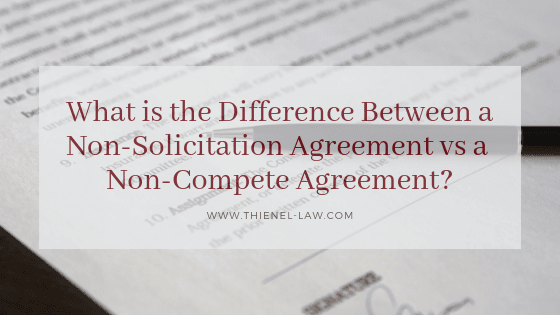What is the Difference Between a Non-Solicitation Agreement vs a Non-Compete Agreement?
[Updated 8/8/24]
As an employer, you must take steps to protect your business interests if an employee leaves. Key employees may try to take customers and clients with them if they quit or you terminate their employment. Using employment contracts can help reduce the risk of losing business to a former employee. Our Maryland business lawyer discusses using a non-solicitation agreement vs. a non-compete agreement and why you might want to include both clauses in an employment contract.
What is the Difference Between a Non-Solicitation Agreement vs a Non-Compete Agreement?
Non-solicitation and non-compete agreements are restrictive covenants included in employment contracts. Restrictive covenants protect the assets and interests of a company during employment and after the employee leaves the company. Other examples of restrictive covenants included in employment contracts include, confidentiality agreements and non-disclosure agreements.
Non-solicitation agreements and non-complete agreements used by many employers to protect an employer from an employee actively competing for business after the employee leaves the company. Even though the agreements may be similar, the agreements cover different aspects of an employee's actions after terminating the employment relationship. Non-solicitation and non-compete agreements are typically included in an employment contract and remain in force after the employment relationship ends.
A Maryland business contracts attorney can help draft employment agreements that prevent an employee from using the information and relationships learned from working with an employer to benefit the employee or the employer’s competition after the employee leaves the company.
What is a Non-Solicitation Agreement?
A non-solicitation agreement is designed to protect a company’s customer base and key employees. The agreement prevents an employee from taking certain actions to convince customers, clients, or employees to leave the company when the employee leaves. A non-solicitation agreement does not restrict the employee from working for a competitor or opening a business in the same geographic location. The agreement does not prevent employees or customers from leaving the company voluntarily. It restricts the activities of the employee only in influencing the person’s decision to leave.
What is a Non-Compete Agreement?
A non-compete agreement restricts an employee’s ability to compete with an employer after the employment relationship is terminated. The agreement states that the employee will not engage in any activity that competes with the employer. The non-compete applies to an employee working for another company that competes with the employer or opening a new business that would compete with the employer.
Enforceability of a Non-Solicitation or Non-Compete Agreement
For a non-solicitation or non-compete agreement to be enforceable, the agreements must be limited in scope. For example, it would be unfair to restrict an employee from working in the same industry forever. Most non-compete agreements are limited in time and geographic area. The agreement may state that the employee is restricted from engaging in activities that compete with the employer for a certain number of years within a certain number of miles of the company’s location. For the agreement to be valid, the employer must offer something of value in exchange for the employee’s promise not to compete with the employer. The value exchanged is typically the initial employment contract.
A non-solicitation agreement may also be restricted in its scope. The agreement may restrict the employee from soliciting customers or co-workers for a limited time. The non-solicitation agreement may also be limited to co-workers or customers that the employee had direct contact with during his or her employment with the company. The employer must also have a valid business reason for enforcing the agreement, such as protecting proprietary customer lists.
Consult a Maryland Business Attorney Regarding Employment Contracts
Non-compete and non-solicitation agreements that are overly restrictive or vague may not be enforceable in court. However, including language in employment contracts that is reasonably restrictive, you can protect your company’s interests. Working with a Maryland business attorney to draft employment contracts can ensure that the clauses of the contract are reasonable and practical. Contact Thienel Law today. Maryland business attorney Steve Thienel is dedicated to assisting clients in Maryland, Virginia, and throughout the DC Metro area.


